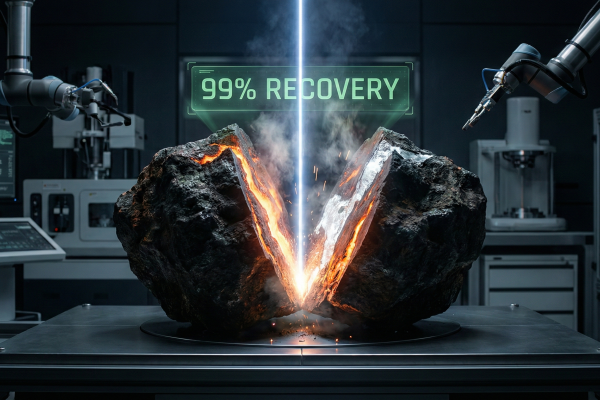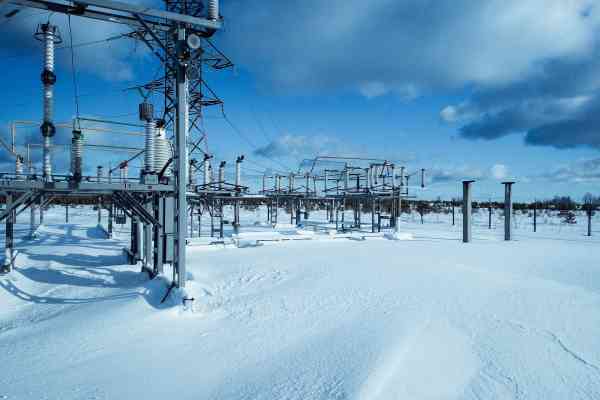MERCEDES-BENZ GROUP AG
Commented by Nico Popp on January 21st, 2026 | 07:00 CET
SGS Canada confirms world-class results: Why Power Metallic Mines is becoming indispensable for Mercedes-Benz, Ford & Co. after a metallurgical breakthrough
There are events that change everything—turning points where hopes become certainty. Often, these shifts take place away from the headlines, in laboratories and testing facilities, where the feasibility of the future is decided. For Power Metallic Mines, such a moment has arrived now. The recently published metallurgical test results for the Lion Zone are far more than just technical data – they are proof that the Company holds an asset capable of sustainably securing supply chains for automotive giants such as Mercedes-Benz and Ford. At a time when the global economy is desperately searching for stable sources of copper and platinum group metals, Power Metallic Mines is now delivering the hard currency of the mining industry: validated extraction rates at world-class levels. For investors, this virtually eliminates the most significant risk faced by an explorer – the question of technical feasibility – and opens the door to a fundamental revaluation of the stock.
ReadCommented by André Will-Laudien on January 19th, 2026 | 07:10 CET
Explosive mix: Critical metals and e-mobility! BYD, Mercedes-Benz, Graphano Energy, and RENK in focus
E-mobility in Germany could gain fresh momentum in 2026, as the CDU wing of the federal government is pushing for the reintroduction of purchase incentives for electric vehicles, retroactively including those registered since the beginning of the year. There is still a need for discussion within the SPD due to other issues. German citizens are familiar with the nerve-wracking process of reaching compromises in Berlin, where a new law can only be passed with five other concessions to the coalition partner. This is how grand coalitions work: slowly and tenaciously. Regardless, the public has become accustomed to this carnival event, and for us, stock market traders, it is important to look at the possible effects of such subsidy decisions. According to estimates from the Federal Ministry for the Environment, available funding could support the purchase of up to 800,000 electric vehicles - roughly 1.6% of all registered vehicles in Germany. The planned incentives aim primarily to ease the transition to e-mobility for low- and middle-income households. Do not look a gift horse in the mouth! How are automotive stocks doing on the stock market?
ReadCommented by Armin Schulz on January 15th, 2026 | 07:05 CET
Undervalued in transition - plus dividends? Analysis of Mercedes-Benz, WashTec, and Sixt
The fundamental transformation of mobility is creating two contrasting realities: while established manufacturers are groaning under massive pressure to innovate and shrinking margins, surprising profit opportunities are emerging in the niches of change. The strategic responses to this tension could hardly be more different. A premium automaker, a vehicle care equipment supplier, and a mobility service provider exemplify where the future of driving can also be lucrative for investors. It is therefore worth taking a closer look at the paths of Mercedes-Benz, WashTec, and Sixt.
ReadCommented by Nico Popp on January 7th, 2026 | 07:10 CET
The clean solution to the dirty nickel problem: How Power Metallic Mines could save the supply chains of Mercedes-Benz and Volkswagen
The automotive industry faces a paradoxical situation in 2026. While sales figures for electric vehicles have stabilized and the technology is becoming increasingly mature, the threat now comes not from demand but from the supply side of the value chain. The supply of raw materials, especially the critical battery metal nickel, is coming under massive pressure due to geopolitical shifts and drastically tightened environmental regulations in Asia. German flagship companies Mercedes-Benz and Volkswagen, which have invested billions in their electrification strategies, are faced with the challenge of reconciling their ethical promises with the physical reality of the market. In this area of tension between regulatory constraints and industrial needs, Canadian explorer Power Metallic Mines is evolving from a raw materials explorer into a potential strategic enabler with its NISK project.
ReadCommented by Nico Popp on December 18th, 2025 | 07:00 CET
Dividend comeback: Why Mercedes-Benz and VW look outdated compared to RE Royalties' model
In a market phase in which interest rates have peaked, and tech stocks are ambitiously valued, investors are once again turning their attention to the oldest source of income in stock market history: dividends. But the hunt for the highest returns often turns out to be a dangerous undertaking, because a high percentage payout is usually not a sign of strength, but a warning signal for falling prices or structural problems. While German automotive giants Mercedes-Benz and Volkswagen attract investors with seemingly favorable valuations and generous returns, their business model is facing the most expensive transformation in history. In this environment, RE Royalties, a Canadian niche stock, is coming into focus. Its business model is specifically designed to generate stable cash flows from the megatrend of the energy transition without bearing the operational risks of an industrial group.
ReadCommented by André Will-Laudien on December 10th, 2025 | 07:10 CET
E-mobility to hit the roof in 2026? BYD on the rise, Graphano Energy strong and Mercedes-Benz chart breakout!
The black-red federal government plans to launch a new subsidy program for electric vehicles and plug-in hybrids at the beginning of 2026. The support is primarily aimed at people with low or middle incomes to make it easier for them to switch to electric mobility. The basic subsidy is expected to be around EUR 3,000 and can increase to a maximum of EUR 4,000 with child supplements and a bonus for very low incomes. Only vehicles with a net list price not exceeding EUR 45,000 will be eligible for funding, which means that higher-priced models will remain outside the program. Both the purchase and leasing of purely electric passenger vehicles (BEVs) and, according to media reports to date, plug-in hybrids will be eligible for funding. At the same time, the existing motor vehicle tax exemption for fully electric vehicles is to be extended, but for a maximum of 10 years and with a horizon until the end of 2035. The pendulum is therefore swinging in favor of electric vehicle manufacturers and necessary suppliers. Now is the time to get started!
ReadCommented by André Will-Laudien on December 8th, 2025 | 07:05 CET
The high flyers of 2026: who will lead the next rally? Almonty, Rheinmetall, BYD, and Mercedes-Benz in focus
As the year draws to a close, investors are already thinking about the next investment year. This is understandable, as hardly any other period in history has brought as much return as the past year. AI, defense, and high-tech stocks led the way, with some even reaching 1,000% in individual cases. However, the price trends also show that stocks that have performed well will eventually enter a consolidation phase. In the case of Almonty, the share price rose tenfold, and even after the correction, it was still up almost 700% at the beginning of December. In addition to fundamental data, timing also plays a decisive role in success. We are thinking about the coming year. Will the old favorites also be the new winners?
ReadCommented by Armin Schulz on November 25th, 2025 | 07:40 CET
Mercedes-Benz searches, Graphano Energy finds, Siemens Energy uses: The three stocks for the next phase of energy storage
The global energy transition is heating up the market for critical raw materials. The spotlight is on a true jack-of-all-trades: graphite. Without it, lithium-ion batteries, which power electric vehicles and modern energy storage systems, simply would not work. But supply is lagging behind rapidly growing demand. This gap poses enormous challenges for supply chains. It is driving up prices, opening up exciting opportunities for companies – both those that source the raw materials and those that forge high-tech products from them. We therefore take a closer look at automotive giant Mercedes-Benz, raw materials expert Graphano Energy, and energy professional Siemens Energy.
ReadCommented by André Will-Laudien on November 24th, 2025 | 09:25 CET
DAX up, NASDAQ down! Automotive sector back in focus with Mercedes-Benz, WashTec, BYD, and VW
The correction in the growth markets continues. Even crypto investors, who are used to success, are now complaining about the pronounced market weakness. November and December are usually good months for the stock market. However, because September and October performed so exorbitantly well, profits are now apparently being taken across the board. For German blue chips, the whole thing has been mild so far, and according to general valuation rules, they also have more room for upward movement. We are diving into the world of electric vehicles and combustion engines, where P/E ratios between 4 and 12 are the norm and real, tangible goods are traded. It is time to put away the AI toys and start the machines.
ReadCommented by Nico Popp on November 19th, 2025 | 07:30 CET
Attention Labor Market Data! Will gold soon take off? Kobo Resources, Barrick Mining, Mercedes-Benz
In Germany, fear has been spreading across many industries for months: How many jobs are still at risk? Concerns are growing, especially among suppliers to the automotive industry in the southwest, where Mercedes-Benz, Porsche, and other industrial giants are struggling with the market environment and their own structural weaknesses. Recent signs also suggest a potential economic slowdown in the US. So far, these developments have not impacted the markets; on the contrary, the probability of a US interest rate cut in December has recently declined significantly. If the labor market data published at the end of the week is poor, this could change abruptly – potentially supporting a renewed rally in gold.
Read









